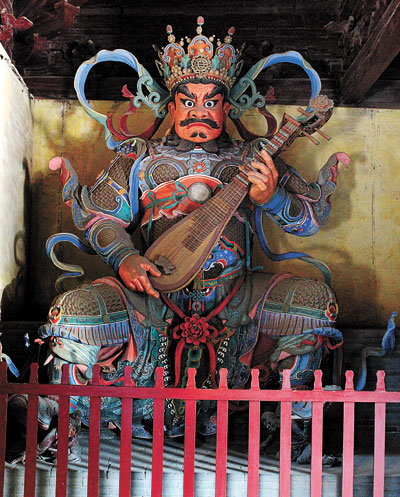
James Baquet jamesbaquet@gmail.com HERE is the third of our Four Heavenly Kings. Called Dhritarashtra in Sanskrit, he is based on the great Hindu god Indra. The first king we met, Virupaksha or Guangmu, was related to Varuna, who was later replaced by this god, Indra. Both are associated with water: Varuna is the lord of oceans and the underwater world; Indra is lord of storms and rivers (which are filled with rain). His color is white, like the lightning. Indra is also the God-king of the Gandharvas, or heavenly beings, who are excellent musicians. Thus Dhritarashtra is the God of Music. The Chinese call him Chiguo Tianwang, or the Heavenly King Who Supports the Country. We almost always see him holding a pipa, a type of Chinese lute, a connection to the Gandharvas. The lute has several connotations. One is that Dhritarashtra is harmonious, a key attribute for maintaining peace within the country. It also is a tool he uses to attract others to Buddhism (just as television evangelists in America use music on their programs). The lute also features in a story about the historical Buddha. It is said that as he was searching for the right path between luxury and asceticism, a group of musicians passed by. An elder was teaching a younger one: “You must make the strings neither too loose, where they cannot produce sound, nor too tight, where they snap. The correct place is exactly in the middle.” Thus the Buddha became a teacher of “the Middle Way.” Finally, Dhritarashtra is in charge of the East. And his folk name, Molihai, indicates that he is pure. | 
